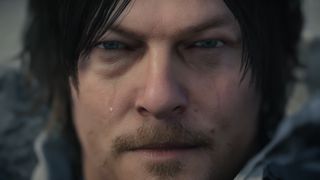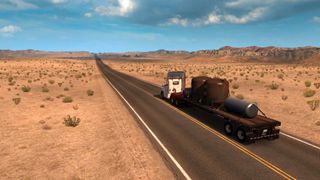6 games to play while you wait for Death Stranding's PC release
If you're waiting until next summer to play Death Stranding, here are some games to tide you over.

There is no obvious substitute for any of Kojima's games, and that's especially true of Death Stranding. It's a postal service walking simulator where you also have to occasionally soothe a crying baby sealed in a mechanical womb strapped to your torso. You have to replace your shoes so you don't get bunions and drink Monster energy drinks to replenish your stamina. You sneak through ghost-infested ruins, hide from magic rain that ages everything it touches, and make grenades from your poo.
Death Stranding is a surreal, bizarre, and very flawed game—and it's not coming out on Steam and Epic until the summer of 2020. That's a long time to wait if you're adamant on playing it on PC, but luckily I'm here to help. While no one game is even remotely similar to the bizarre mix of ideas in Death Stranding, I've made this very good and totally serious list of games that might make an okay substitute while you cross days off the calendar waiting for its PC release.

American Truck Simulator
American Truck Simulator is a game about driving trucks and Death Stranding is the equivalent of attempting to carry all of the groceries in from the car in one trip. But both are connected by an obsession for traversing the great American frontier. Where they differ, however, is in how each depicts The United States. American Truck Simulator is the romanticized version—all rolling plains, glowing sunsets, and country music—whereas Death Stranding depicts America much like it is today: A deeply fractured society haunted by the ghosts of its past and impending climate disaster. Good times.
Regardless of their tone, American Truck Simulator and Death Stranding find joy in honest work. Whether you're driving a truck through Utah or just trying to not tip over because you thought strapping seven boxes to your back was a smart move, there's a humble satisfaction that comes from doing a job and doin' it well.
Nier Automata
Like Kojima, Yoko Taro is a Japanese videogame auteur with an obsession for audacious, sometimes nonsensical stories that ooze style. And 2017's Nier: Automata might well be his magnum opus—an epic piece of sci-fi about androids battling over the ruined leftovers of Earth. In the same way that Death Stranding fearlessly experiments with different systems and concepts, Automata plays with the shape and form of action games. One second you're playing a beat 'em up and the next minute you're in a bullet hell shooter, fighting a giant robot in a spacesuit weaving through thousands of projectiles.
But, like Death Stranding, underneath all that flash and style is a deeply human story that isn't afraid to ask the big questions. You might not always like the answer (or it'll just be flat-out dumb), but Nier: Automata is a surprisingly heartfelt game wrapped up in a lot of jarring weirdness and explosive action.

Mother Simulator
One of the weirdest concepts in Death Stranding is the "BB" that you have strapped to your chest while making your deliveries. It's a baby that bridges the gap between the living world and the afterlife so you can see when otherwise invisible ghosts are nearby so they don't drown you in motor oil—Death Stranding's version of a game over. Like any baby, your BB needs care and attention, and if you agitate it too much it'll begin to cry.
The biggest gaming news, reviews and hardware deals
Keep up to date with the most important stories and the best deals, as picked by the PC Gamer team.
Though no one trusts me enough with a real baby to know for sure, to me that sounds an awful lot like parenthood. And if there's one game that totally nails parenting, it's Mother Simulator. Much like Death Stranding, your goal is to juggle the needs of your helpless baby with other objectives—in this case it can be anything from surviving an ice age to explosive diarrhea caused by the stomach flu. Okay so maybe that's not a realistic simulation of parenting, but if you enjoy the idea of listening to a crying baby for hours each night and don't have a PS4 (or a uterus), Mother Simulator will have to do.

QWOP
Death Stranding's voyages through the American wasteland probably sound a little boring, but the game tries hard to make the trek challenging. You have to carefully plot your route, avoid spectral predators and greedy bandits, and even work to keep your balance so you don't tip over and spill all your precious cargo. The latter ends up being a frustrating mini-game of mashing the triggers on the controller to help Sam adjust his balance while he runs over broken terrain. Eventually, though, you'll screw up and find yourself careening down a hill at full-speed, limbs flailing wildly.
Death Stranding's attempts to simulate the nuances of human movement are about as successful as legendary browser game QWOP (and often just as frustrating). This game drives home the complexity of human locomotion by having you control the calves and thighs of a runner—only it's 20 million times harder than it sounds to even take a single step forward without falling flat on your face. To really complete the aesthetic, listen to some sad ambient electronica.

Metal Gear Solid 5: The Phantom Pain
Okay, let's say you're legitimately looking for a game that'll while away the days until Death Stranding's PC release. Have you played Metal Gear Solid 5 yet? It's Kojima's previous game and it's just as ridiculously ambitious and flawed as Death Stranding and has at least 50 percent less metaphors. Despite its second act being an unfinished mess, this is one of the greatest sandbox stealth games ever made.
There's a lot of shared DNA between each game that makes The Phantom Pain a good substitute. As Snake you infiltrate enemy bases and explore big open worlds, cutscenes have Kojima's trademark bravado, and while there isn't a baby strapped to your chest, you do get a killer attack dog that'll take out enemies for you. What more could you want?

Journey
You might not know about it, but Death Stranding has a really neat multiplayer system where objects players build and place in its world (like ladders bridging a raging river) will sometimes appear in your own world for you to use. That kind of innovative but indirect multiplayer was first popularized in games like Dark Souls and Journey, which was finally ported to PC earlier this year.
Journey isn't weighed down by all the heavy exposition of Kojima's storytelling. You are simply a cloaked figure in a desert trying to reach a glowing mountain. Along the way, though, you'll be paired up with other players on the same mission as you. There's no real way to communicate except for tapping a key to emit a little noise, but you'll quickly develop a shared language as you two navigate the perils and wonders of the mountain. It's this fragile connection to another human that makes Journey's bitter and often harrowing adventure profound.
With over 7 years of experience with in-depth feature reporting, Steven's mission is to chronicle the fascinating ways that games intersect our lives. Whether it's colossal in-game wars in an MMO, or long-haul truckers who turn to games to protect them from the loneliness of the open road, Steven tries to unearth PC gaming's greatest untold stories. His love of PC gaming started extremely early. Without money to spend, he spent an entire day watching the progress bar on a 25mb download of the Heroes of Might and Magic 2 demo that he then played for at least a hundred hours. It was a good demo.
Most Popular



